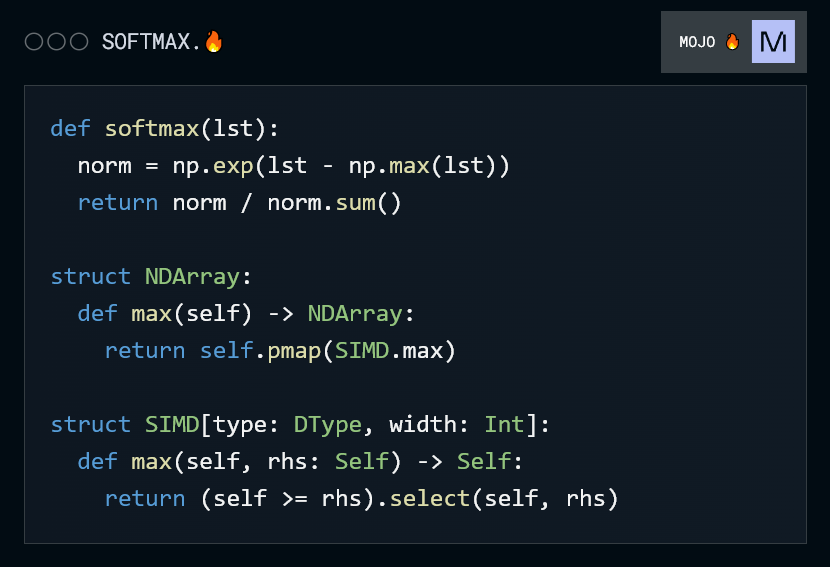Python has become the de facto programming language in the field of artificial intelligence (AI) and machine learning (ML) due to its simplicity, flexibility, and rich ecosystem. However, Python’s current implementation, CPython, faces several limitations when it comes to systems programming and performance, giving rise to the ‘two-world problem’ where Python and low-level languages like C and C++ must coexist to achieve high performance.
Introduction to Mojo
Mojo is a new programming language designed to address these challenges, seamlessly integrating with the existing Python ecosystem and providing a solution that unifies systems programming and AI/ML development. Mojo aims to leverage Python’s strengths while overcoming its performance limitations, and accommodating the growing complexity of heterogeneous hardware accelerators and deployment challenges.
Mojo’s Key Features and Compatibility
Mojo is designed to be fully compatible with the Python ecosystem, allowing developers to run existing Python3 code ‘out of the box’ using CPython’s runtime. This ensures full compatibility with the entire Python ecosystem, while also enabling a smooth migration path for Python code to Mojo.
Powerful Systems Programming Extensions
let and var Declarations
Mojo introduces let and var declarations, which provide a more explicit way to create function-scoped variables. let is used for immutable values, while var is used for mutable values. Both support lexical scoping, name shadowing, type specifiers, patterns, and late initialization.
def your_function():
let x: Int = 42
let y: F64 = 17.0
let z: F32
if x != 0:
z = 1.0
else:
z = foo()
print(z)
Struct Types
Mojo introduces struct types to enable high-level and safe abstractions on top of low-level data layout controls, indirection-free field access, and other niche tricks. Struct types are similar to classes, but with static field bindings and compile-time inlining.
struct MyPair:
var first: Int
var second: Int
fn __init__(self&, first: Int, second: Int):
self.first = first
self.second = second
fn __lt__(self, rhs: MyPair) -> Bool:
return self.first < rhs.first or
(self.first == rhs.first and
self.second < rhs.second)
Structs provide better performance and control over memory layout, as well as guaranteed static initialization.
Strong Type Checking, Overloaded Functions, and the fn Declaration
Mojo brings robust type checking and function overloading capabilities to the table, which enables more control, predictability, and safety in your code.
Strong Type Checking
Mojo allows you to employ strong type checking using its struct type. This ensures that the correct data types are used and provides compile-time errors for any mismatches.
def pairTest() -> Bool:
let p = MyPair(1, 2)
# Uncomment to see an error:
# return p < 4 # gives a compile time error
return True
Overloaded Functions & Methods
Mojo supports overloaded functions and methods, allowing you to define multiple functions with the same name but different arguments.
struct Complex:
var re: F32
var im: F32
fn __init__(self&, x: F32):
self.re = x
self.im = 0.0
fn __init__(self&, r: F32, i: F32):
self.re = r
self.im = i
fn Declaration
Mojo introduces the fn declaration, which is a stricter version of the def declaration. While both fn and def are interchangeable on an interface level, fn enforces more restrictions in its body, making it suitable for systems programming.
fn myFunction(x: Int) -> Bool:
return x > 0
# Raises a compile-time error if the 'x' argument is not used.
The key differences between fn and def are:
- Argument values are immutable by default in
fn. - Type specifications for arguments and return values are required in
fn. - Local variables must be declared explicitly in
fn.
Conclusion
Mojo extends Python’s capabilities by offering strong type checking, overloaded functions, and a stricter alternative to the def declaration. These features cater to the needs of systems programmers and developers who seek more control, predictability, and safety in their code.
As a result, Mojo has the potential to revolutionize AI/ML development and improve performance across the board.
Related Resources




